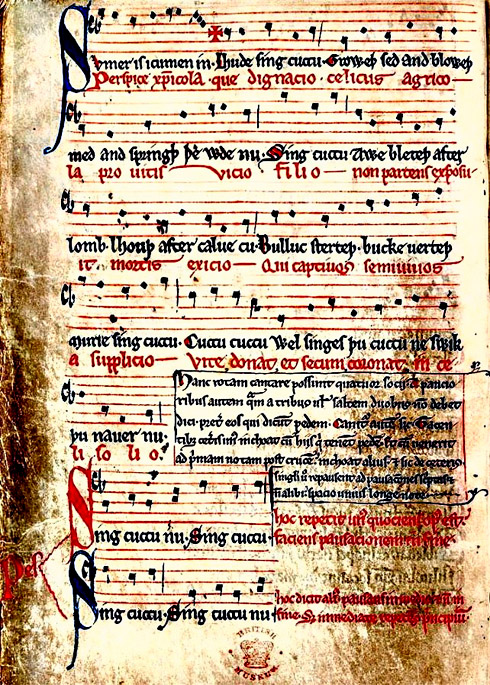Sumer Is Icumen In
"Sumer Is Icumin In" est un des plus vieux canons, si pas le plus vieux, paru sous forme imprimée (vers 1226).

Sumer Is Icumen In
Le printemps est venu
Canon
Canon
(Moyen Anglais)
(Français)
Svmer is icumen in
Lhude sing cuccu
Groweþ sed
and bloweþ med
and springþ þe wde nu
Sing cuccu
Awe bleteþ after lomb
lhouþ* after calue cu
Bulluc sterteþ
Bucke uerteþ**
Murie sing cuccu
Cuccu cuccu
Wel singes þu cuccu
ne swik þu nauer nu
Sing cuccu nu. Sing cuccu.
Sing cuccu. Sing cuccu nu.
Le printemps est venu,
Chante fort, coucou !
Les graines poussent
Et le pré fleurit
Et les bois bourgeonnent à nouveau,
Chante, coucou !
La brebis bêle après l'agneau,
La vache meugle après le veau,
Le bouvillon saute,
Le cerf pète.
Chante joyeusement, coucou !
Coucou ! Coucou !
Tu chantes bien, coucou,
Ne t'arrête plus maintenant.
Chante maintenant, coucou ! Chante, coucou !
Chante, coucou ! Chante maintenant, coucou !
Notes
*"Lhouþ (Lhouth" veut dire "low" qui signifie "moo", c.à.d. meugler (source: OED).
** Il y a des désaccords sur le sens de "verteth". Quelques définitions proposées:
-Farts ("pète")
-Darts ("se précipite")
-Harbour in the green ou fern ("s'abrite dans la verdure"), vert venant du français.
Dans l'alphabet du Moyen Anglais, la lettre þ est "thorn" (épine), l'équivalent du "th" moderne. Nous l'avons substituée par "th" dans les paroles ci-dessous pour rendre le texte plus lisible au lecteur moderne.
Sumer is icumen in,
Lhude sing cuccu!
Groweth sed and bloweth med
And springeth the wde nu,
Sing cuccu!
Awe bleteth after lomb,
Lhouth after calve cu.
Bulloc sterteth,
Bucke verteth,
Murie sing cuccu,
Cuccu, cuccu!
Wel singes thu, cuccu;
Ne swik thu naver nu.
Sing cuccu nu. Sing cuccu.
Sing cuccu. Sing cuccu nu.
Et de là l'orthographe moderne :
Summer is a-coming in,
Loudly sing cuckoo,
Groweth seed and bloweth mead
And springeth the wood now,
Sing cuckoo.
Ewe bleateth after lamb,
Low'th (Moo) after calf the cow,
Bullock starteth,
The buck verteth (farts or darts)
Merry sing cuckoo!
Cuckoo, cuckoo,
Well thou sings Cuckoo,
Nor cease thou never now.
Sing Cuckoo now. Sing Cuckoo.
Sing Cuckoo. Sing cuckoo now.
Voyez plus bas la photo complète du manuscrit original.

Commentaires
Noté et peut-être écrit par John of Fornsete, un moine de l'Abbaye de Reading qui est mort en 1239. Certains pensent que l'auteur était W. de Wycombe, mais personne ne sait avec certitude qui l'a écrit.
Vous pouvez en lire plus sur Sumer Is Icumen In ici (en anglais).




